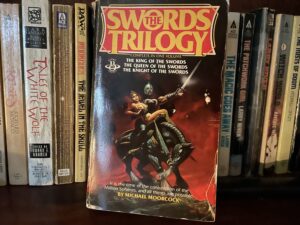
It seems impossible to write about a book without invoking the reviewers personal connection with the book and the author. Age, circumstance, and location can have an effect on how a book hits any given reader. I won’t be able to perform the impossible, you may be surprised to learn. I’ve made no secret that I’m not the world’s greatest fan of Michael Moorcock. His works did not hold up for me as I aged (I won’t say matured.) Your mileage, as they say, may vary. And that’s fine with me. The point is that I still retained a soft spot for The Chronicles of Corum, the follow up to The Swords Trilogy. I read it three or four times as a youth. Perhaps it was the riffs on Irish mythology, which I was exploring at the time. Perhaps it was that terrific cover. I don’t know. Whatever reason, it was one of the last of the Moorcock paperbacks I sold off. I’ve since collected one or two, but have few of the Eternal Champion tales on my shelves. When I saw a copy of The Swords Trilogy in quite decent condition at the used bookstore I hesitated only briefly. That one I’d read only once and had only limited recollection of. I recall it being vivid, colorful, and weird. Why not take a chance on a re-read?
I am, on balance (heh) glad I did so. The Swords Trilogy collects three short novels: The Knight of Swords, The Queen of Swords, and The King of Swords. Each novel depicts the efforts of Corum Jhaelen Irsei to defeat the titular Lord of Chaos in each of three closely related planes/dimensions. Corum is an avatar of the Eternal Champion (like Elric), of a race similar to the Melniboneans. So one of Moorcock’s elves by other names. Corum is similarly moody and broody. The first novel provides us ample reason for his attitude, as humans slaughter all of his race, leaving him the last of the Vadhagh. (Or, so he believes.) Thus he has a quest for revenge, which runs through all three books. But more immediately he gets caught up in scenarios that require him, as I mentioned, to defeat the god of each of three dimensions.
If you’ve read any of the Eternal Champion novels, none of this will be particularly new. In fact the last book ties in directly to one of Elric’s stories. Some familiarity with the Eternal Champion Cycle isn’t necessary, but it does add a dimension. In many ways, then, this isn’t something I should have enjoyed that much. Moorcock’s idiosyncratic thematic shibboleths are on full display. But the sheer velocity of the narrative helped carry me right past them without even an eye roll. (Well, maybe one or two. “…the mourning wind found an echo of sadness in their own souls….” Ugh.)
That narrative speed, coupled with sheer, infinitely creative bravura, which takes you on a blistering tour through epically gonzo settings following one after another, is what provided the pleasure in this re-read. Short paragraphs provide the illusion of velocity. Brief, punchy descriptions of the bizarre and outre keep the reader zipping past plot holes, lack of cohesion, slapdash world building, and contradictory timelines. None of that matters here. It’s all about the psychedelic light show. If the show is good, certain issues with plot coherence are irrelevant. And the show is good. I had fun.
I don’t imagine I’ll be picking up another copy of The Chronicles of Corum anytime soon, however. Instead I’ll walk away leaving Corum to a happy ever after, pretending the inevitable tragic end of the second series never occurs.
So, a positive review. Keep that fact in mind as I move on to the commercial stage of today’s web log post. Looking for something to read? (Here imagine that I am closing my eyes and tossing a dart at the vanity shelf.) Pick up a copy of Under Strange Suns. The reviews are positive, for whatever that is worth.

1 comment